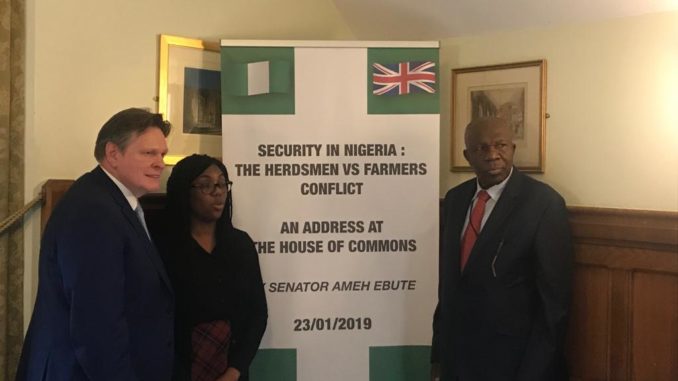
The President of the Senate in the Third Republic, Senator Ameh Ebute, has revealed how the Nigerian military has been able to tackle the lingering crisis between herders and farmers in the country.
Ebute specifically noted that military has been able to curtail the nagging crises between the two groups.
Speaking at a Roundtable with MPs of the British Parliament, January 23, 2019 at the House of Commons, London, United kingdom, the former lawmaker faulted former Chief of Army Staff, TY Danjuma over his recent submission that soldiers where partial in their fight against terrorism.
Ebute said Danjuma was wrong because any Nigerian soldier that engages in acts of brigandage or molestation of civilians is now promptly disciplined accordingly under the current administration.
Senator Ameh Ebute delivered a position paper titled “Tackling the Violence between Livestock Farmers and Cultivators in Nigeria” before an audience that consisted of Chairmen and Members of committees of the British Parliament on Human Rights, Defense, Environment, as well as African Ministers, and a cross section of delegation from Nigeria.
He posited that “violent clashes between two sets of farmers in Nigeria, cultivators, and livestock farmers have been a major feature of the Nigerian security landscape since 2003. These clashes escalated in late 2017 with the massacre of over a hundred people at Agatu in Benue State. 2018 witnessed a further deterioration in the violence.”
“While a responsible government has a solemn obligation to ensuring the safety of its citizens and implementing policies and programs that engender peaceful co-existence among its ethnic, regional and religious diversities of its population, it must ensure too that crisis between any two groups of its population is not exploited for the selfish and nefarious purposes of its detractors.”
Senator Ebute further argued that the administration of President Muhammadu Buhari was able to make substantial gains in the fight against terrorism. “Boko Haram was routed from its Sambisa Forest stronghold. The Nigerian military recaptured Mubi, Gwoza, Baga and other major cities and villages that had been overrun by Boko Haram. Coordinated attacks by the air force and the army seriously degraded the fighting capabilities of Boko Haram.”
“Recognizing the regional dimensions in Boko Haram activities, the Buhari administration initiated a multilateral approach to fighting against Boko Haram by entering into a regional alliance with the neighboring states of Niger, Chad, Cameroon and the Republic of Benin. Hundreds of thousands of Nigerians who had fled to those neighboring countries in the wake of Boko Haram seizure of their towns and villages returned to Nigeria.”
Some of the most prominent military deployments included Operation Lafiya Dole, Operation Sharan Daji, Operation Awatse, Operation Shirin Harbi, Harbin Kunama I, Harbin Kunama II, Operation Crocodile Smile I, Operation Python Dance I, Operation Dokaji, Operation Egwu Eke (aka Python Dance II, Operation Harbin Kunama II, Operation Whirl Stroke. These operations are against terrorism, cattle rustling, kidnappings and robberies, banditry, and sabotage of oil facilities, theft of oil, and perpetrators of livestock/cultivators violence.
“In addition to military operations designed to end terrorism and curtail other forms of violence, the Buhari administration has promptly deployed the police to areas of violence to curtail the violence and arrest the perpetrators.”
On the various allegations of the complicity of President Muhammadu Buhari in fueling the farmers/herders conflict, Senator Ebute posited that there is no shortage of conspiracy theories to explain the violence between livestock farmers and cultivators in Nigeria and they range from mildly misinformed attempts to explain a complicated social situation to outright falsehoods.
“The most often encountered of these theories blame President Buhari directly alleging that his ethnic affinity with the Fulani livestock farmers either encourages the violence or makes Buhari turn a blind eye to the violence.” He further argued that “conspiracy theories on violence in Nigeria are given credence when otherwise respectable public figures use them as an explanatory framework for what is going on.”
He gave the example of retired Lt. Gen. T.Y. Danjuma, a former Chief of Army Staff, as one of the purveyors of falsehood on the efforts of the Muhammadu Buhari led administration in tackling the farmers/herders conflict in the country.
“Danjuma had asserted quite incorrectly that the violence in Benue and Taraba states between cultivators and livestock farmers was a result of cooperation between members of the Nigerian armed forces and renegade Fulani groups. This is certainly true. It is probable that the type of cooperation that Gen. Danjuma had described might have taken place when he was a minister of defense and the general impression that members of his group, the Jukun, rented soldiers in their violent struggle with their neighbors, the Kutebs.”
“It was also during Danjuma’s tenure as minister of defense that soldiers opened fire on unarmed civilians at ODI in Rivers State and Zaki-Biam in Benue State killing many people and burning down the entire villages. That type of behavior can longer be authorized nor tolerated. Any Nigerian soldier that engages in acts of brigandage or molestation of civilians is now promptly disciplined accordingly under the current administration.”
Senator Ebute consequently eulogized the international community for the assistance it has rendered to the government of Nigeria in tackling its security challenges. “the government and people of Nigeria appreciate the help it has received from the international community, but the international community can do more to help Nigeria tackle its security challenges.”
“The Nigerian armed forces need arms, ammunition, actionable intelligence to deal with Boko Haram and other security issues. Nigeria is trying to revamp its small defense industry and cannot yet manufacture all the military equipment it needs. It is important for Britain and other international partners to supply needed weapons and materials to Nigeria. Nigeria is not calling for foreign troops on its soil. Nigerians will do the fighting themselves. Terrorism is a global problem and must be tackled globally”.